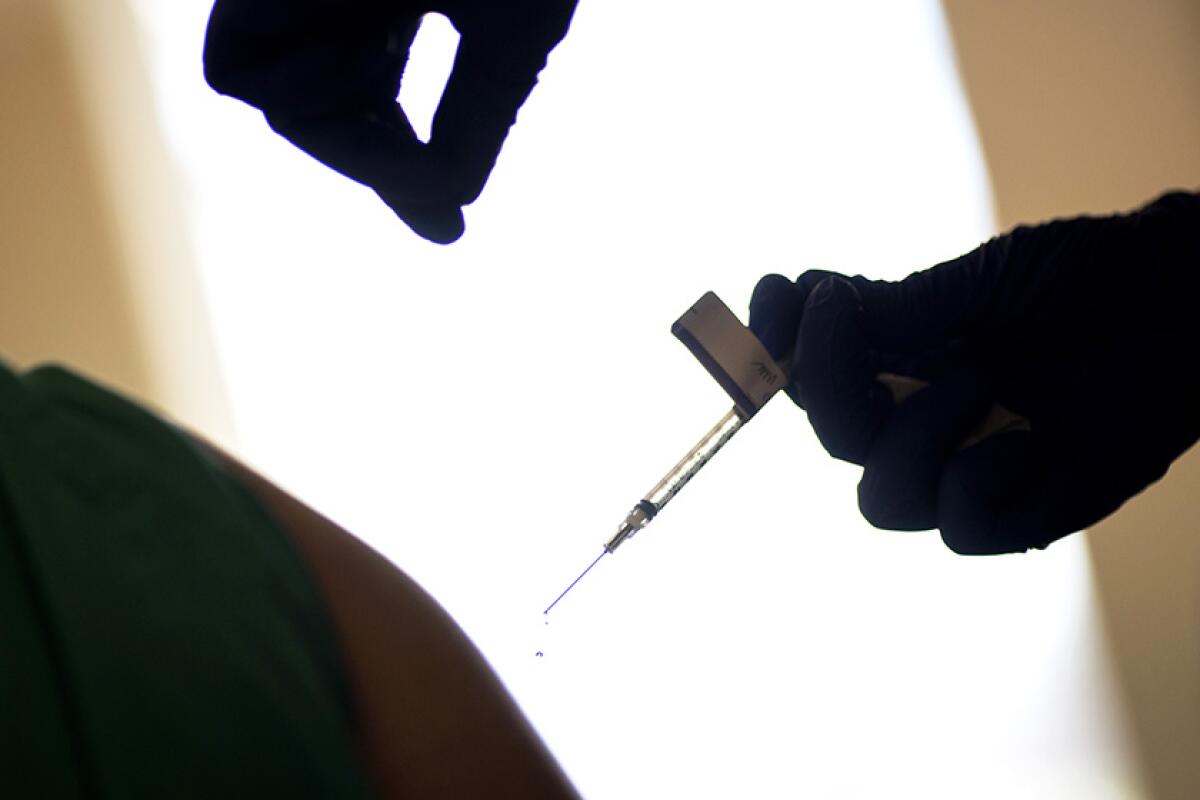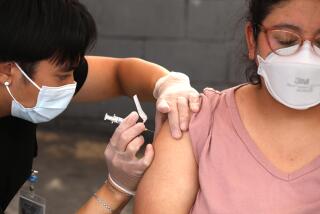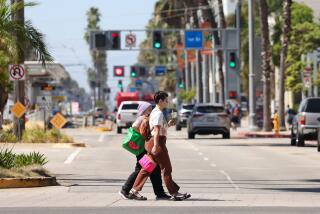Column: For two years, I’ve tried to protect myself from COVID-19. Now I’ve tested positive

- Share via
I was supposed to be getting my second vaccine booster this week. Instead, I failed a COVID test.
I tested because my daughter, a teacher, had a positive test and I’d spent time with her. Still, I was dumbstruck by my positive result.
My daughter wound up coughing and aching and couldn’t smell the candle she loves, but I have yet to experience a single symptom. In fact, with all the vitamin-taking and oxygen-monitoring and resting I’ve done while I quarantine, I feel healthier than I’ve felt in months.
When a few days passed, with no signs of illness, the skeptic in me figured the test I took must be wrong. But the doctor I spoke with ruled that out. It’s a highly reliable rapid test that detects genetic material from the virus at “exquisitely” low levels, he said.
It’s almost embarrassing to finally confront the demon I’ve feared for two years and find that the version afflicting me packs a punch I cannot even feel. I’m apparently among the 30% to 40% of people with the coronavirus whose infections are so mild, they are asymptomatic.
I would like to take some credit for that: I’m vaxxed and boosted and still masking around strangers and indoors in public places.
But the truth is that while we know that vaccinations blunt the severity of the disease, we don’t yet fully understand why some infected people have no symptoms at all, while others wind up hospitalized and so many die. And no one can say whether long-haul COVID-19 difficulties await asymptomatic people down the line.
I know all this because I have spent my quarantine holed up in my bedroom, panic-Googling, trying to figure out what is going to happen to my asthmatic, senior-citizen self.
In the process, I stopped feeling odd and began to feel uncommonly lucky. Somehow a global disease that has killed more than 6 million people, and is still causing untold suffering, had spared me the worst of its misery.
During the past few months I’ve felt increasingly safe, as infections declined and Los Angeles County’s COVID-19 hospitalizations plunged from 4,800 to less than 300.
But I knew that a few days of symptom-free infection didn’t guarantee I was out of the woods. It can take as long as two weeks after exposure for debilitating symptoms of COVID-19 to emerge. And that knowledge has made every allergy-related sneeze feel like it could be a death knell.
But six days in, two separate tests have found no more virus in my system.
That is not surprising, according to Dr. George Rutherford, an epidemiologist at UC San Francisco and one of California’s foremost COVID-19 experts. He says people with asymptomatic infections don’t necessarily have less virus in their bodies, but they may be able to clear the virus more efficiently.
“We were doing a lot of contact tracing in the early days,” Rutherford recalled. “That’s when the virus had a longer incubation period, and we could get to people before they were infectious” so they would not unknowingly infect others.
Now that the disease can incubate in three days, “we just have to throw up our hands” and look for new ways to stop asymptomatic spread, Rutherford said.
I’m grateful to be in the asymptomatic category. But a positive test result still carries a taint; like a scarlet letter declaring to the world that you have done something wrong.
Perhaps I failed to pay enough attention to the rise of the supercontagious BA.2 Omicron subvariant.
I’m certified negative now, but I’m following CDC guidelines: quarantining at home and wearing a mask every time I leave my room. Still, it’s hard to have full confidence in the rules any more when they can’t necessarily keep up with the virus’ evolution.
Don’t get me wrong. I will resume masking in public when my home confinement ends. But I will also stop expecting this pandemic to ease anytime soon. Many asymptomatic people won’t know they have the virus and move through their days unmasked.
I’m going to stop obsessing over fluctuating COVID rates and new, more infectious varieties. I’ll stop poring over the numbers — which told me that people my age are the least likely to be asymptomatic. And I’m going to start taking better care of myself, day in and day out.
What this past week has taught me is that we are just pretending to understand this virulent, mysterious and unpredictable pandemic.
We bury ourselves in statistics, as if that gives us a sense of control. But what does the case count even mean now that so many folks are testing themselves at home and no one is tallying those results?
I appreciate all the work the researchers are doing. Rutherford said there are now tantalizing hints that blood type may be linked to COVID-19 immunity. That kind of revelation might lead to new ways to prevent or treat the disease. But even a perfect understanding of the big picture won’t mean we can predict the course of an individual infection.
“From a public health standpoint, we’re not worried about you. ... You’re a good outcome,” Rutherford said. “Not as good as having no infection. But having an asymptomatic infection, we’ll chalk that up as a win.”
And right now, that sounds pretty good to me.
More to Read
Sign up for Essential California
The most important California stories and recommendations in your inbox every morning.
You may occasionally receive promotional content from the Los Angeles Times.











